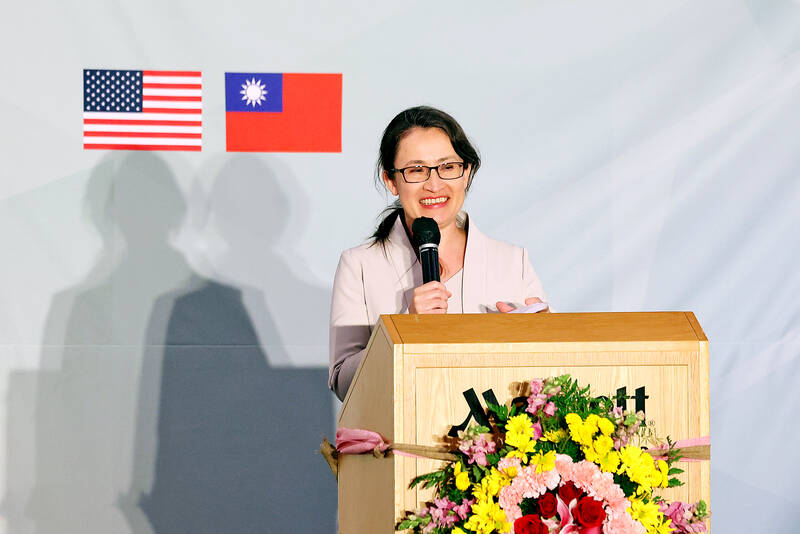Representative to the US Hsiao Bi-khim (蕭美琴) said China’s economy has clear signs of a slowdown that would inevitably spill over to the region.
“There are some alarming indications and we are impacted,” Hsiao told Bloomberg, citing a drop in Taiwan’s exports to China. “Despite all the political and strategic tension, we are interested in prosperity for the people on both sides of the strait.”
China’s economic slowdown has sharpened Taiwan’s focus on reducing its exposure to the world’s second-largest economy, with its businesses looking to diversify away from it, Hsiao said in an interview at Bloomberg’s Washington bureau.

Photo: CNA
“Given the risk of over-dependence on any economy, friendly or not, it is important to ensure that we are less vulnerable,” she said on Friday, adding that “We have been working to diversify our global assets and global presence.”
US President Joe Biden last month called China a “ticking time bomb,” referring to the economic problems the Chinese Communist Party is facing. “That is not good because when bad folks have problems, they do bad things,” he said.
On Sunday, Biden said China’s downturn might diminish Beijing’s inclination to invade Taiwan, adding that the country’s economic troubles have left his Chinese counterpart with “his hands full.”
Hsiao said leaders in Taipei are carefully considering all possible scenarios, including the “worst-case scenario,” when asked if she was worried that a slowing economy could push Chinese President Xi Jinping (習近平) to militarily attack Taiwan, or enforce an economic blockade on the nation.
“Any signs of coercion or military aggression is not good for business,” she said. “That is our understanding. We certainly hope that is also the understanding of the leaders in Beijing.”
China is Taiwan’s largest trading partner, accounting for 25.2 percent of total trade and 21.6 percent of Taiwan’s imports in 2021, the US Department of Commerce’s International Trade Administration found. The US accounts for 12.6 percent of Taiwan’s total trade and 10.2 percent of imports, making it Taiwan’s second-largest trading partner.
Taiwanese companies consider market calculations more than political ones, Hsiao said.
“Companies are thinking about how to position assets in a way that best protects their company interests,” she said.
Taiwan is home to the world’s leading chipmakers, and has faced a prolonged dip in demand for its technological goods, including semiconductors.
However, a year-long slump in Taiwan’s exports eased last month, as rising global demand for artificial intelligence-related technologies hinted at a positive future outlook.
China has fallen below expectations for a stronger recovery post-COVID-19. Beijing’s government has rolled out a slew of incremental measures to revive business confidence and help the property market, though they have so far avoided any large-scale fiscal stimulus amid concerns over the high debt levels in the economy.

Hong Kong authorities ramped up sales of the local dollar as the greenback’s slide threatened the foreign-exchange peg. The Hong Kong Monetary Authority (HKMA) sold a record HK$60.5 billion (US$7.8 billion) of the city’s currency, according to an alert sent on its Bloomberg page yesterday in Asia, after it tested the upper end of its trading band. That added to the HK$56.1 billion of sales versus the greenback since Friday. The rapid intervention signals efforts from the city’s authorities to limit the local currency’s moves within its HK$7.75 to HK$7.85 per US dollar trading band. Heavy sales of the local dollar by

To many, Tatu City on the outskirts of Nairobi looks like a success. The first city entirely built by a private company to be operational in east Africa, with about 25,000 people living and working there, it accounts for about two-thirds of all foreign investment in Kenya. Its low-tax status has attracted more than 100 businesses including Heineken, coffee brand Dormans, and the biggest call-center and cold-chain transport firms in the region. However, to some local politicians, Tatu City has looked more like a target for extortion. A parade of governors have demanded land worth millions of dollars in exchange

Taiwan Semiconductor Manufacturing Co’s (TSMC, 台積電) revenue jumped 48 percent last month, underscoring how electronics firms scrambled to acquire essential components before global tariffs took effect. The main chipmaker for Apple Inc and Nvidia Corp reported monthly sales of NT$349.6 billion (US$11.6 billion). That compares with the average analysts’ estimate for a 38 percent rise in second-quarter revenue. US President Donald Trump’s trade war is prompting economists to retool GDP forecasts worldwide, casting doubt over the outlook for everything from iPhone demand to computing and datacenter construction. However, TSMC — a barometer for global tech spending given its central role in the

The Financial Supervisory Commission (FSC) yesterday met with some of the nation’s largest insurance companies as a skyrocketing New Taiwan dollar piles pressure on their hundreds of billions of dollars in US bond investments. The commission has asked some life insurance firms, among the biggest Asian holders of US debt, to discuss how the rapidly strengthening NT dollar has impacted their operations, people familiar with the matter said. The meeting took place as the NT dollar jumped as much as 5 percent yesterday, its biggest intraday gain in more than three decades. The local currency surged as exporters rushed to